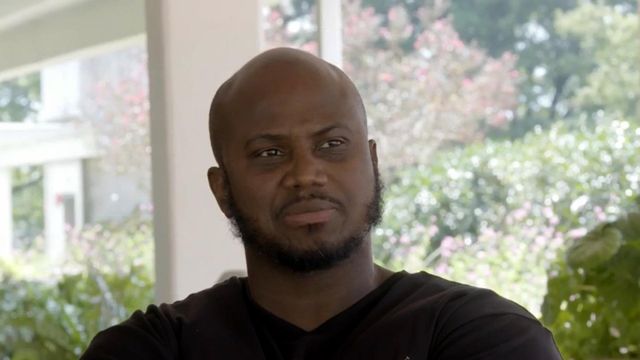'I want them to know I'm actually innocent': Freed man fights for pardon, compensation
Five years after prosecutors decided against retrying the case and dismissed all charges against Derrick Michael Allen, he is still fighting to be compensated for the years he spent in prison before his conviction was overturned.
Allen was sentenced to 43 to 54 years in prison for the 1998 sexual assault and death of his then-girlfriend's 2-year-old daughter. He was babysitting the toddler when he called 911 to report that she was unresponsive. An autopsy determined the child died of shaken baby syndrome.
For more than 20 years, Allen has maintained he didn’t commit the crime. He entered an Alford plea in the case, which allows a defendant to maintain his innocence while acknowledging that prosecutors have enough evidence for a conviction. He told WRAL Investigates the plea was only so he could avoid a possible death sentence.
"They used the death penalty as like this tool against me," he said. "It was better to go to prison, take this plea and fight and get back, get back in court and go from there."
After years in prison, Allen said he learned the evidence used against him wasn’t what prosecutors claimed. So, he went to a judge with the new information, setting off a legal whirlwind.
In 2009, Superior Court Judge Orlando Hudson vacated the Alford Plea, and he dismissed the charges altogether a year later after an audit of the State Crime Lab raised concerns about blood test results in Allen’s case.
In 2012, the North Carolina Court of Appeals overturned Hudson’s dismissal and sent Allen’s case back to the Durham County District Attorney’s Office. Four years later, citing the inability to find witnesses, prosecutors decided not to retry the case.
"I was ready to go to trial. I’m still ready to go to trial, and they won’t take me," Allen said.
Although he's free, he wants his name cleared.
"I want my life back. I want them to know that I’m actually innocent," he said.
Allen said he feels he was wrongfully incarcerated and wants compensation for the time he spent in prison, which is allowed under state law.
Greg Taylor also was convicted of murder with the help of bad blood testing in the crime lab. He was later deemed innocent by the state’s Innocence Inquiry Commission and received $750,000 in compensation.
But Allen's case remains stuck in legal limbo.
WRAL Investigates spoke to several people who helped create the Innocence Inquiry Commission, who said the case is no longer eligible for a hearing for three reasons:
- He doesn’t have an active conviction for rape and murder. His record was expunged.
- He doesn’t have new evidence to prove his innocence. The crime lab audit doesn’t count since Hudson already considered that when setting Allen free initially. Innocence commission rules say the plaintiff needs evidence that hasn’t already been judicially reviewed.
- He’s not actively incarcerated for the crimes. While the law doesn’t specifically exclude Allen for that reason, it does say currently incarcerated inmates take priority. WRAL Investigates was told the commission’s workload is so large, they can get to cases only of people currently in prison.
"The judge, my defense counsel and the DA could have done their jobs and gotten me in front of the Innocence Inquiry Commission," Allen said. "I feel like nobody wanted to deal with the truth."
Rep. Pricey Harrison, D-Guilford, who helped craft the 2006 law that created the Innocence Inquiry Commission, said she isn't so sure Allen's case couldn't still go before the panel.
"The Innocence Commission is interpreting the statute very narrowly," Harrison said. "We think he’s eligible because he was convicted wrongfully."
Allen's only hope now is a Pardon of Innocence from the governor, which is something Gov. Roy Cooper has granted only six times in almost five years in office. While he has an official case number after filing for his pardon, Allen is still frustrated.
"It bothers me that he won’t grant me, or give, the pardon so I can move forward with my life," he said.
"There has been a giant backlog in the governor’s clemency office," said Harrison who has been taking part in routine protests outside of the Executive Mansion to raise awareness about the lack of action on clemency petitions.
She’s now sponsoring legislation to give the wrongfully convicted people another option – present their case in front of a Superior Court judge to be deemed innocence and become eligible for compensation.
"There are a lot of innocent men and women in our state who have spent decades in prison and still haven’t gotten access to the compensation they’re due," she said. "It’s frustrating to see these folks suffer because, if you get an expunction, it’s still difficult to turn your live around."
Allen recently had a courtroom victory when the 4th U.S. Circuit Court of Appeals reinstated his civil lawsuit against Jennifer Elwell, the State Bureau of Investigation agent who performed the blood tests in his case. That lawsuit seeks damages for violating Allen’s constitutional rights.
Essentially homeless because he has difficulties getting and keeping jobs, Allen continues to fight for his future while remembering his past.
"It’s going to take everything it took for me to remain sane while I was in prison," he said.












